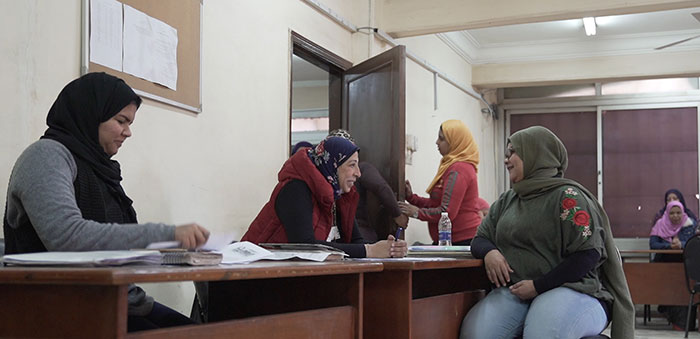Enabling women entrepreneurship in Egypt
Our Hemayet Partnership: Strengthening the Economic Viability of Women in Egypt

“It feels rewarding to be involved with a program that provides significant direct benefit to a particularly vulnerable group of people – a program that not only reduces risk, but helps advance low-income women. The program illustrates the societal value of insurance and reinsurance, and the important role the sector can play in improving people's lives.”
Mario Wilhelm
Head of Middle East and Africa for Swiss Re's Public Sector Solutions team
Imagine walking through a market street somewhere in Northern Africa. In this dynamic and buzzing environment, you can spend hours bargaining with various sellers of spices, fruits, handcrafts, clothing or jewelry.
Less apparent is that the people you're buying goods from are often vulnerable to a variety of risks that could affect their livelihood and the well-being of their families. Some of these risks, such as going to hospital for maternity care, would be taken for granted in many other places in the world.
However, the small businesses operating in many of the large cities across the African continent are run by women, who are generally uninsured for some of the very basic risks. In Egypt, the costs of health care beyond the government support, such as loss of income or the daily commute to the hospital for treatment, can be a burden for small business women. As a population, Egyptians end up paying nearly 89% of their expenses out of pocket. This is nearly double the world average, according to the World Bank.
While commercial insurers have primarily focused on the Egyptian middle class, Women's World Banking, in partnership with Lead Foundation, Axa Egypt and Swiss Re are working to reach this underserved population with an insurance programme they've named, Hemayet Lead ("Lead's Protection," translated from Arabic). The program targets low-income women, who are funding their business through Lead's microloans. Hemayet not only provides insurance but helps advance women's financial inclusion and economic empowerment.
Initially, Hemayet Lead's insurance add-on provided hospital cash that paid the fixed nightly cost of hospitalization, and offered life insurance to cover the customer's micro-credit loan. Customers received hassle-free claims settlements, to ensure that people get their money when they need it most.
The partnership is very much a meeting of like philosophies and a shared vision for what insurance can achieve. We are partnering to build societal resilience at the most practical level. An insurance product enables LEAD to differentiate itself in the market, thereby generating new business. While for Swiss Re and Axa Egypt, the Microfinance channel is open a new risk pool of small business women who were not previously provided with insurance.
The program has been a general success. Almost 200,000 customers are now covered, and the program is expected to break-even in less than 3.5 years of commencing insurance operations. A healthy claims ratio is a sign that this is a sound business model – providing payouts but also allowing for a sustainable net income.
Swiss Re and Women's World Banking aim to extend this concept to 2 million consumers globally by 2021. This means replication in further markets, but also organic growth in Egypt by extending cover to families.